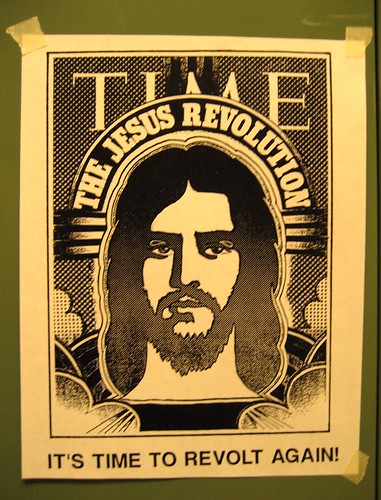Father
walks into Son’s bedroom. Son is laying
on a single bed, playing with what looks like marbles in a box. On the wall are posters and bumper stickers:
“Creation: Love It Or Leave It” and “You Deserve A Sabbath Today” and “Next
Time You Think You’re Perfect, Try Walking on Leviathan” and “The Few, The
Proud, the Creators.”
Father:
(Cautious) Hey, Son.
Son:
(Sulking, but trying not to show it)
Hey, Dad.
Father:
Haven’t seen you around lately.
Son:
Been busy.
(Pause)
Father:
(Trying to sound interested) Oh,
really? Doing what?
Son:
You know. The usual.
Father:
(Sighs) Let’s pretend I don’t know, okay?
Son:
Whatever. Well, right now I’m trying out
a new atomic number.
Father:
That sounds cool. Is it stabilizing?
Son:
I’m sure it will. Just need a bit more
dark matter. Few more quarks.
Father:
Great. That sounds great.
(Pause.
Son keeps playing with marbles in the box.)
Father:
So… I haven’t seen you around lately.
Son:
Yeah, you said that.
Father:
I kinda hoped that you’d show up at the last staff meeting.
Son:
Oh, you wanted me to be there?
Father:
Since you are on the creation staff… yeah, I thought you might want to show up.
Son:
I don’t really see the point.
Father:
Since you were so significant in starting this whole mess, I
thought you might want a part in cleaning it up…
Son:
Dad, don’t put that on me again…
Father:
Look, we need to talk about this. You
were instrumental in the initiation of this project, and at first you were at
the heart of sustaining as well, but your heart just hasn’t been in it
lately. Why? Is there something wrong? Something I did?
Son: (Rolling eyes) Dad, no, I mean, you’re perfect.
Father:
That’s true, but I’m trying to understand your perspective.
Son:
It’s just… I’m still disappointed.
Father:
About what?
Son:
About the humans.
Father:
What about them?
Son:
Well, look, Dad. I thought that maybe
you’d finally put me in charge of something.
I’m old enough now, I think.
Maybe you don’t think I’m responsible enough—I don’t know. And here was this project. The big one.
We were remodeling the earth—again—but this time I really thought we had
hit on it, we had done it right. This
was the final try. But instead of being
put in charge of the project, you handed it off to… him. The human.
I mean, he was a great idea—brilliant, really. The capstone of the whole project. But whose idea was it to put him in charge?
Father:
I think you know…
Son:
Yes, Dad, it was your idea. And I know
you’re perfect and all, but— but—… What a lame idea! It wasn’t too many generations later that the
whole project had to be wiped out and drafted again, all because of those
humans.
Father:
Noah was a good man.
Son:
Yeah, fine, when he wasn’t drunk out of his skull! You told him about fermenting grape juice
didn’t you?
Father:
He had a long, hard life...
Son:
Sure he did. That’s because all of these
humans—all of them, from Adam to Noah on down— are all STUPID! As a group they are technologically brilliant,
but whether in a group or individually they are moral imbeciles! They are just as likely to worship a stump of
wood as they are a true god. And the way they treat each other—paranoia, lack of empathy, rejection
and being rejected for the most idiotic reasons—“Oh, you’re stepping on my
land, looks like I need to kill you…”
Just ridiculous!
Father:
Moses wasn’t ridiculous.
Son:
Yeah, he’s the only one who would pay attention to you.
Father:
Abraham paid attention.
Son:
Sometimes. But the incident with Abimelech…
Father:
Hey, he’s only human…
Son:
That’s the point! They’re ALL only
human. Yeah, Dad, you chose some great
ones there (although I still have some questions about Samson) but still, as a
race they have no right to rule. No
right to be in charge of my project!
Father:
So, you see this as really being yours?
Son:
Oh, no, Dad. It’s yours. All yours.
I wouldn’t want to be in charge of it now.
Father:
Oh, really?
Son:
No way, it’s all too messed up now… (Father
stares at the Son) Stop it! Stop this omniscient bit, it’s getting really
annoying.
Father:
You would like to be in charge of the project.
Son:
Well, I think I could do things better…
Father:
Then why not show up to the staff meetings?
Son:
C’mon, Dad. The staff meetings are a
joke. You know that Satan’s plan is just
to wipe the whole project out. He’s got
most of the staff in his pocket, and they are all subtlety subverting all of
humanity against you. They are trying to
force you into a corner to just destroy the whole project and start with
something else. So the staff meetings
end up being as ironic as a human committee: (Begins imitating the council) “This human’s great!” “Oh no, Most High, let me show you what he’s
really like.” “Well, you can try.” And there are these manipulations of nations
that end up changing nothing at all. It
just doesn’t matter if it’s Babylon or Persia or Greece
or Rome—humanity
is still just as stupid and just as immoral.
Father:
So you think you could do better.
Son:
You bet I could! We just need to get rid
of these gods that encourage evil and guide them into following your law. Who knows, perhaps even humans can be trained
to do right, if they had the right guidance.
Father:
So you want to replace the gods?
Son:
Dad, look, they’re taking all the credit that belongs to you. All creation honors these lesser beings and
ignore the Most High. You’d
think they’d know better, but they don’t.
If we got rid of the gods, we can retrain all of creation and not have
to wipe it out again.
Father:
Hmmm… good plan Son. Of course, the gods
wouldn’t like that.
Son:
So who cares? You just get rid of them.
Father:
I could… if I had a good enough reason. I
can’t just willy-nilly get rid of whatever power in heaven I want to.
Son:
Why not? You’re the Most High, right?
Father.
Of course. Technically I can do whatever
I want. But for me to be just, I have to
have sufficient reason to do away with any being. I don’t just destroy life because I can. Well, look Son. I’ve always thought that you had the best
aptitude to deal with this project—certainly you were more involved in it
initially than any of the others.
Son:
Well, sure. I got to spend time with my
Dad.
Father:
Yeah. It was great, wasn’t it?
Son:
It sure was. (Pause.) I’m sorry,
Dad. I… guess I could show up to more
staff meetings. Participate more. It’s enough to know that you’d listen to me,
even if no one else does.
Father:
Thanks for the thought. But I have
another committee in mind for you.
Son:
(Unsure) Really? Not the Subcommittee of Restricting
Unapproved Epiphanies? I really think
that those guys are…
Father: No, this committee is really… unique. And I think you alone have the gifts to do
it.
Son:
What is it?
Father:
I want you to train the humans.
Yourself.
Son: (Sighs) Dad… you know what happens. You get a
group of humans, and there’s all this bowing and “Almighty” this, and nothing
ever gets done, and no one listens to you.
Father: But it might be a way to train the humans not
to worship the other gods.
Son:
And replace them for me instead. Sure, I
can train them, but it seems wired into the human genome to worship any old
slug, as long as it’s got something “glorious” about it.
Father:
Not if you are human yourself.
Son:
(Shocked) What?
Be a… I don’t think you know what
you’re asking.
Father:
I sure do. It’s the biggest challenge
anyone’s faced.
(Long pause)
Son:
But humans… breathe, Dad. All those
germs constantly entering into their lungs, then passing through the tissue and
entering the blood stream. The bacteria
they have in their intestines. Their
mouths—they are like a living, walking, zoo!
Disgusting!
Father:
I understand. If you recall, I made the
design.
Son:
But I’d have to give up creating. Give
up my life’s work…
Father:
You won’t stop creating. Just think of
it as just finishing the work you had begun.
Son:
I don’t know, Dad. I mean, if they just
saw some human descending from heaven, they’d certainly think that I was a god,
no matter what the body…
Father:
That’s why you’d have to be born human.
Son:
In a womb? Floating in amniotic fluid
for nine months?
Father:
Yep.
Son:
Unable to speak for… years? Humiliated
by human parents every day? Never seen
as more than a slave? And then… puberty?
Father: All of these experiences are a part of what
makes one human. If you are going to
have the experience, you have to have the full experience.
Son:
Adam didn’t, and wasn’t he fully human?
Father:
And look how he turned out.
Son:
I don’t think being pushed through a vagina would have changed him that much!
Father:
(Smirking) You never know until you
try.
Son:
Dad, this is disgusting!
Father:
Yes, I know. And it is even worse than
that. You will be abused by those who
need you the most. There will be
attempts to kill you and there will be nothing you can do. The gods will come after you, but I will
protect you in some limited ways. But
all of this, all of your power, all of your knowledge—you’ll have to set it
aside. The only things you can do or
know will be what I give you on a day by day basis. It’s a tough job.
Son:
I just can’t. This is too much! Asking me to give up everything I know. Only to become one of those filthy creatures
you erroneously placed in charge of that chaos?
I can’t imagine. It just isn’t
worth it.
Father:
It isn’t worth rebuilding all of creation?
It isn’t worth finishing the project you began? If the project isn’t worth some
self-sacrifice, think of this. All
along, you regretted the fact that I gave humans the opportunity to rule the
planet. I believe you called them
“filthy worms” at the beginning.
Son:
Well, I was exaggerating…
Father:
Fine, I accept that. But the fact of the
matter is, I DID give humans rule over creation. And I can’t just take it away. That’s one thing I will never change, if I
make a promise, I keep it.
Son:
Didn’t you promise Moses you’d kill off the Israelites?
Father:
That wasn’t a promise, it was a threat.
You’re getting off the subject.
One way or another, it is a human who will rule all creation. That’s the foundation of the whole
project. A human will rule, not a
heavenly being, but one bound to the earth, made from earth…
Son:
Yeah, so, a human will rule… Oh, I
see. So this gives me the rule over
creation. (Brightens) You are giving
the project to me!
Father:
I’m giving you the OPPORTUNITY to have the
project. It must be given to a human. If you become a human, it is possible for you
to be in charge of the whole project.
Son:
And the other gods?
Father:
If they don’t become human, they aren’t even in the running.
Son: And Satan?
Father:
Don’t underestimate him, Son. He will do
everything he can to stand in your way.
And it is possible for him to stop you. You will have to defeat him. But remember this—you can’t defeat him
through your creation powers. You can’t
defeat him through a human army. There
is only one way to defeat him…
Son:
Which is…?
Father:
We’ll talk about that later. What I need
to know now is, are you going to make the attempt?
Son:
To be human?
Father:
Yes. And to be completely obedient to me.
Son:
I always do what you say, Dad.
Father:
Yes, but trust me, your submission to be will be tested to the utmost limit.
Son:
Are you telling me to do this?
Father:
Only if you want to.
Son: (Closes eyes) If I want?
Of course not. It is the most
horrifying thing I could ever imagine.
Being one of those crawly beings on that planet. Giving up all the honor and power I have
here.
Father:
So your answer is…
Son:
Yes! Oh, yeah. The possibilities… wow. I’ll have to start making plans. Thanks Dad, this is a great opportunity. (Looks directly at Father) Thanks for giving it to me.
Father:
(Smiling, he shakes his head) You are such a weird kid…









